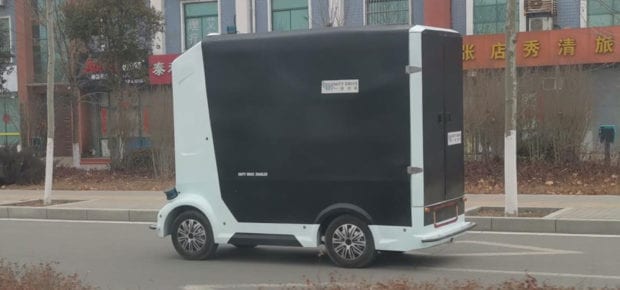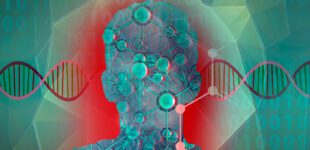April 21, 2020
Essential services like the transporting of goods must continue under COVID-19 social distancing protocols in order for us to receive life-sustaining products, such as food and medical supplies.
IEEE Senior Member Ming Liu and a team of engineers at his technology startup have developed a solution that can help reduce in-person transmission of the virus through the use of an autonomous vehicle named Hercules.
“Many daily activities such as transporting goods inevitably involve person-to-person contact,” explains Liu. “To achieve contact-less transportation of goods, using an autonomous vehicle has become the preferred choice.”
How Autonomous Delivery Vehicles Run
Hercules is designed with autonomous navigation capability and a variety of hardware technologies including a Drive-by-Wire (DBW) chassis, an Industrial Personal Computer (IPC) and sensors.
A Vehicle Control Unit (VCU) responds to critical safety signals including stop signs and other road signals, explains Liu. Sensors are also installed in the bumper and tires to avoid collisions on the road.
Hercules knows how to get to its destination through the use of a software platform in the cloud. “The map server stores the pre-built map for the traversed environments,” explains Liu. “A scheduling server performs the task allocations and collects the status of every registered running vehicle. It also plays the role of accessing the map data for routing, transmitting sensor data into the map server, recording the key information into the log server, and replaying the data recorded for a good trace-back.” This information keeps Hercules and others safe while it navigates.
Liu’s autonomous vehicle is already navigating busy urban streets in various cities across China and delivering fresh vegetables to residential areas, boxed meals from restaurants and spray disinfectants to hospitals.
“We have been serving over 1,000 km during this period by delivering vegetables to confined areas without people-to-people contact,” says Liu. “We also help deliver food to check points and help with disinfection
for hospital areas.”
Liu’s startup has hired 100 employees and is preparing to put its assembly line into high gear in the next several months in order for autonomous vehicles like Hercules to become more accessible across the globe, reports IEEE Spectrum.
Technology has once again bridged the gap of connection to provide and maintain essential services while continuing to keep us safe and at a distance.







 Meaningful Momentum or Running in Place?
Meaningful Momentum or Running in Place? AI Through Our Ages
AI Through Our Ages Liquid Infrastructure: Our Planet's Most Precious Resource
Liquid Infrastructure: Our Planet's Most Precious Resource The Impact of Technology in 2025
The Impact of Technology in 2025 Quantum and AI: Safeguards or Threats to Cybersecurity?
Quantum and AI: Safeguards or Threats to Cybersecurity? Why AI Can't Live Without Us
Why AI Can't Live Without Us Bits, Bytes, Buildings and Bridges: Digital-Driven Infrastructure
Bits, Bytes, Buildings and Bridges: Digital-Driven Infrastructure Impact of Technology in 2024
Impact of Technology in 2024 Emerging AI Cybersecurity Challenges and Solutions
Emerging AI Cybersecurity Challenges and Solutions The Skies are Unlimited
The Skies are Unlimited Smart Cities 2030: How Tech is Reshaping Urbanscapes
Smart Cities 2030: How Tech is Reshaping Urbanscapes Impact of Technology 2023
Impact of Technology 2023 Cybersecurity for Life-Changing Innovations
Cybersecurity for Life-Changing Innovations Smarter Wearables Healthier Life
Smarter Wearables Healthier Life Infrastructure In Motion
Infrastructure In Motion The Impact of Tech in 2022 and Beyond
The Impact of Tech in 2022 and Beyond Cybersecurity, Technology and Protecting Our World
Cybersecurity, Technology and Protecting Our World How Technology Helps us Understand Our Health and Wellness
How Technology Helps us Understand Our Health and Wellness The Resilience of Humanity
The Resilience of Humanity Harnessing and Sustaining our Natural Resources
Harnessing and Sustaining our Natural Resources Creating Healthy Spaces Through Technology
Creating Healthy Spaces Through Technology Exceptional Infrastructure Challenges, Technology and Humanity
Exceptional Infrastructure Challenges, Technology and Humanity The Global Impact of IEEE's 802 Standards
The Global Impact of IEEE's 802 Standards Scenes of our Cyber Lives: The Security Threats and Technology Solutions Protecting Us
Scenes of our Cyber Lives: The Security Threats and Technology Solutions Protecting Us How Millennial Parents are Embracing Health and Wellness Technologies for Their Generation Alpha Kids
How Millennial Parents are Embracing Health and Wellness Technologies for Their Generation Alpha Kids Space Exploration, Technology and Our Lives
Space Exploration, Technology and Our Lives Global Innovation and the Environment
Global Innovation and the Environment How Technology, Privacy and Security are Changing Each Other (And Us)
How Technology, Privacy and Security are Changing Each Other (And Us) Find us in booth 31506, LVCC South Hall 3 and experience the Technology Moon Walk
Find us in booth 31506, LVCC South Hall 3 and experience the Technology Moon Walk Virtual and Mixed Reality
Virtual and Mixed Reality How Robots are Improving our Health
How Robots are Improving our Health IEEE Experts and the Robots They are Teaching
IEEE Experts and the Robots They are Teaching See how millennial parents around the world see AI impacting the lives of their tech-infused offspring
See how millennial parents around the world see AI impacting the lives of their tech-infused offspring Take the journey from farm to table and learn how IoT will help us reach the rising demand for food production
Take the journey from farm to table and learn how IoT will help us reach the rising demand for food production Watch technical experts discuss the latest cyber threats
Watch technical experts discuss the latest cyber threats Explore how researchers, teachers, explorers, healthcare and medical professionals use immersive technologies
Explore how researchers, teachers, explorers, healthcare and medical professionals use immersive technologies Follow the timeline to see how Generation AI will be impacted by technology
Follow the timeline to see how Generation AI will be impacted by technology Learn how your IoT data can be used by experiencing a day in a connected life
Learn how your IoT data can be used by experiencing a day in a connected life Listen to technical experts discuss the biggest security threats today
Listen to technical experts discuss the biggest security threats today See how tech has influenced and evolved with the Games
See how tech has influenced and evolved with the Games Enter our virtual home to explore the IoT (Internet of Things) technologies
Enter our virtual home to explore the IoT (Internet of Things) technologies Explore an interactive map showcasing exciting innovations in robotics
Explore an interactive map showcasing exciting innovations in robotics Interactively explore A.I. in recent Hollywood movies
Interactively explore A.I. in recent Hollywood movies Get immersed in technologies that will improve patients' lives
Get immersed in technologies that will improve patients' lives